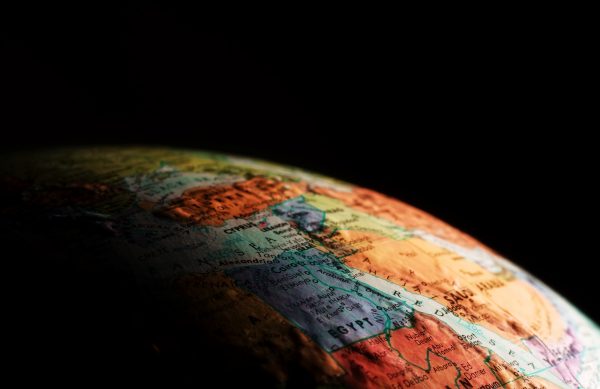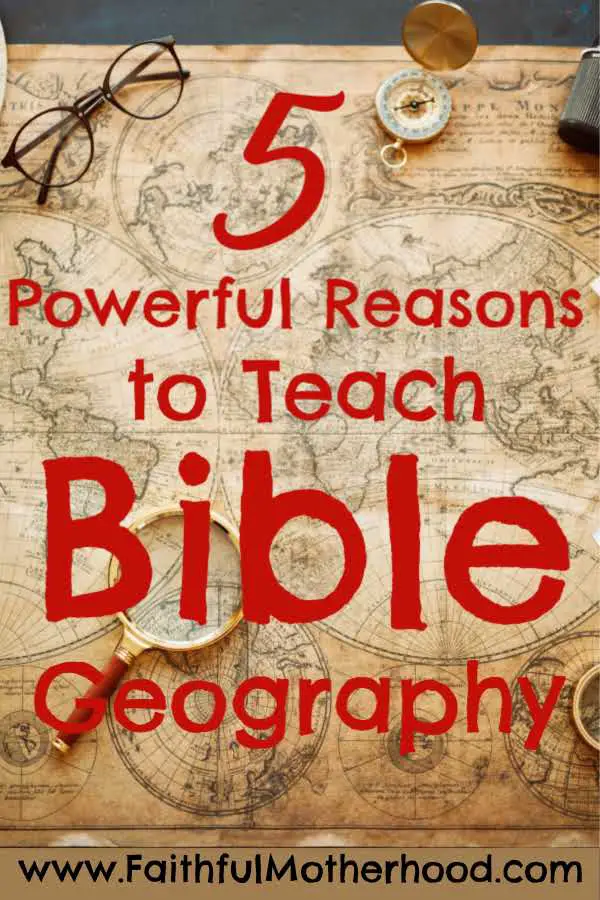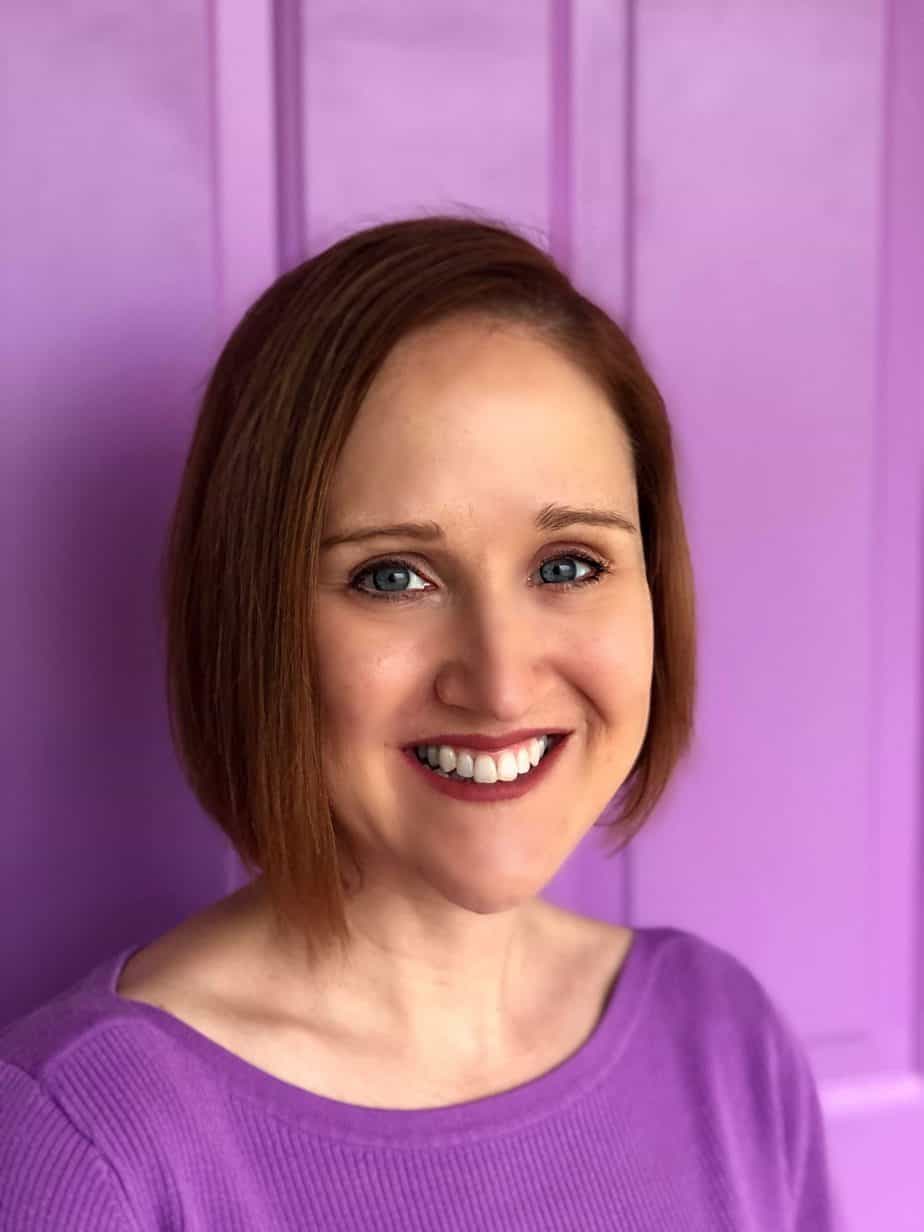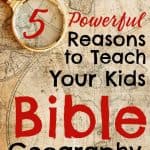Did you get much geography education growing up? If so, you were lucky. One of the things I have loved learning and exploring with my children is redeeming my geography education. It can be fun and easy.
The most powerful connections have come for me from studying bible geography. I want to inspire you with five reasons to teach bible geography to build the faith of your family!

#1 Teach Bible Geography because the Bible is NOT a Story
“Today, in class, we are going to talk about the story of Abraham….” Our children are used to hearing Bible stories at church.
The world would have them believe that those Bible stories are just that -stories. Stories are made-up fiction with characters to tell a moral lesson. The Bible records the lives of REAL people who lived in REAL places. These are stories but history!
Most of the history of the Bible takes place in the land of Jesus’ birth. If we are going to place our hope in Jesus, doesn’t it make sense to study the place where he lived and walked and died?
#2 REAL Places have REAL locations
Once upon a time in a land far away…This is how fairytales begin. We do not want our children to equate Bible stories with fairytales. We want our children to know that these stories are real.
Real places have real locations. Help your children at home, and the children at church, find those places. Help the adults find those places too. They struggle as well.
Can your child find Israel on a map? Do they know where they live on a globe? How amazing it is the gospel traveled all the way across the world to them!
#3 We study Biblical Geography because God created the World and Everything in It
As Christians, we should study the geography of the Bible and the world because God made the world. The mountains, rivers, valleys, and hills around us are not there by accident. When we study nature, we can see God’s amazing hand at work in the big and small details of life.
“In the beginning, God created the heavens and the earth.” – Genesis 1:1 ESV
We honor God when we study his creation and give thanks. Studying nature gives us amazing insight into God as a thoughtful designer. Studying the places where people have settled on the Earth, and the things that have happened in those places, reveals to us God’s hand on history as well. It reminds us that God is weaving our story today, as well. Perhaps we are where we are in the world right now for a purpose as well!
“The mountains rose, the valleys sank down to the place that you appointed for them.” Psalm 104:8 ESV
#3 Studying Bible Geography Helps Us Make Connections
When we teach biblical geography, we are training our children to pay attention to the names of places in the Bible. By connecting the place name with a location, we are creating a memory peg in the wall of their mind for them to hang more information about that place on.
Several years ago, my husband and I had the privilege of traveling to Greece and Turkey. We were there to tour the various Biblical sites. It was absolutely amazing. I can still picture myself walking down the main road of Ephesus and in their colosseum.
I had studied the book of Ephesus many times, but to be in the place made the lives of those early Christians come alive for me. I was inspired to learn so much more about how the location and geography of their city influenced their lives and ministry.
Now, we can’t all afford to take a trip to see the places in the Bible, but we can share pictures and maps to make those places come alive.
Our children’s most powerful connection with the town of Bethlehem is the story of Jesus’ birth. Our children need to know how to find the place where their Savior was born!
#5 Explore Bible Geography & Archeology as Apologetics
We can reinforce the historical truth of the Bible by studying biblical archeology. Some of the places mentioned in the Bible are not inhabited today, but their remains are being investigated.
Seeing pictures of these places gives a visual reminder that the stories of the Bible are about real people in real places. Do not underestimate the power of this positive reinforcement in the mind of a believer.
When our children grow up, they will be assaulted by others who tell them that this Bible is not true. Explore the independent evidence together to build a solid foundation for your children and yourself.
How to Teach the Geography of the Bible
Teaching Biblical geography doesn’t have to be stressful or expensive. We can learn more about the land and cities of the Bible through studying maps, tracing maps, keeping a geography notebook, and watching documentaries. For the price of some ink and paper, along with resources that you already have, you can get started learning the geography of the Bible.
Bible Maps and Map Tracing
A lot of Bibles have maps in the back to aid in studying the Bible. Don’t get overwhelmed by the information in all of those maps; just pick one with which to start your studies. I suggest a map of Israel from Jesus’ time.
Now, you are going to create a blackline master of that map. Simply make a photocopy of the map. Then, take a dark marker and trace the outline of Israel. Pick out the names that you recognize and put dots where those towns are located. Outline the Sea of Galilee, the Jordan River, and the Dead Sea.
The final step is to place another paper on top and trace over just those dark lines and dots that you make with your marker. Congratulations, now you have a blackline master. Keep a master copy of this map and make copies for your family to use. Next, you will need to make a map key. Take a copy of your blackline master and label the different features you choose. Label the bodies of water and label those important towns.
We commit the image of Jesus’ land to memory by the daily work of either tracing the map and then labeling it, or drawing the map and labeling it. When we are done, we check our work. Your first drawing might be less than stellar, but keep at it and you will be amazed at what you can create and what you will learn.
Geography Notebook
As you read the Bible yourself, as a family, or at church – note the places that you hear. You can get a simple notebook and write the name of each place on a page and then what happened at that site.
Or, if you get a Bible map – put up a small sticky note for that town and a short note about what happened there.
Watch Documentaries Together about the Bible
Most families today watch way too much television. We need to be more intentional about what we are watching and learning. Choose instead to watch something that builds your family’s faith.
There are many exceptional items to watch on RightNow Media. There are also great ideas to watch with a careful (previewed!) YouTube search as well.
Will your kids grumble? Of course! Usually, though, my kids keep watching because it is what is on the television!

Use your Bible Map & Go tell the World
Don’t stop with the geography of the Bible. God created the whole earth. As we study the geography of the world, we can also study how God’s story is spreading across the face of the globe as well.
We are called to go to the world about Jesus. Learning about God’s world is foundational to praying for others and serving them. We may start with the land of the Bible, and then our courage will grow to begin studying the rest of the world.
For example, if we don’t know that the unreached people of Thailand exist, how can we pray for them? When we learn where their country is and how few of its people are Christian, we are moved to pray. As our heart grows for them, God will bring opportunities for us to serve them.
Start learning the geography of the Bible today. Turn to the back of our Bible. Include the maps as part of our daily Bible study. Buy a map and hang it up in your home. Open the door to where God will lead your family when you teach Bible geography!
Related Posts:
Why You Need to Memorize the Books of the Bible
7 Creative Tips to Memorize the Books of the Bible
How to Memorize the Books of the Old Testament

The voice behind FaithfulMotherhood.com is Jyn. She is a veteran homeschool mom of three. More than just a pastor’s wife, she holds a Master of Divinity degree and has served in church leadership for over 20 years. Her passion is equipping parents to live out their calling as the number one faith influencer for their children. She longs to see moms empowered by God’s Word and transferring that love to their children through daily Bible study and family devotions.






